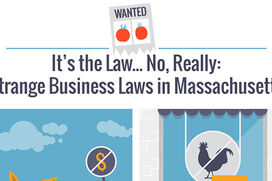
Strange Business Laws in Massachusetts

Given Massachusetts' colonial history, a number of restrictive laws, or "blue laws' as they are commonly known, remain on the books from well over 300 years ago. Such laws were designed and implemented to regulate the behavior of local citizens, and were a consequence of a time when the church and state were combined, Boston.com explained. Typical blue laws are religious in nature, and tend to pertain to the restriction of business around the Sabbath and on holidays, such as the prohibition of commerce and trade activities on Thanksgiving.
While many Bay State residents are aware of these more obvious restrictions, few are likely knowledgeable of the many downright bizarre and illogical laws that remain on the books from puritanical times and continue to be a part of Massachusetts General State Law, despite being unconstitutional in many cases. Below is a sample of 6 strange colonial laws that persist today:
- It's illegal to kiss in public, Boston.com explained.
- It's illegal to be seen to be lazy or idle for more than a few minutes at a time. Summer sunbathers beware!
- It's illegal to frighten pigeons away, according to Boston.com.
- You're not allowed to give beer to sick people, Go Local Worcester detailed.
- Residents are prohibited from using the Lord's name in vain.
- All men must carry a rifle to church on Sunday, WCVB stated.
But the puritans can't be solely to blame. The Commonwealth also has a number of odd and restrictive business laws on the books, some of which are more contemporary in nature. For example, few are aware that it is illegal to hang a vending machine from a utility pole, or that squirt guns are entirely banned in the town of Marlborough! Below is a guide to some of the strangest business laws in Massachusetts:
- Real estate agents are not required to tell prospective buyers that a house may be haunted.
- Bullets cannot be used as currency.
- It is illegal to use tomatoes in a clam chowder recipe.
- All candy must contain less than 1 percent alcohol.
- Rabbits and chickens that have been dyed a new color cannot be sold.
 Back to Top
Back to Top
